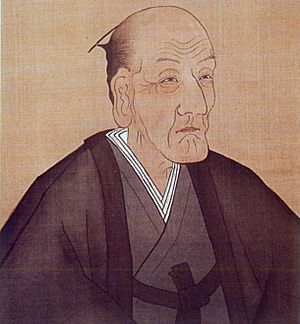Uesugi Harunori facts for kids
Quick facts for kids
Uesugi Harunori
|
|
|---|---|
| 上杉 治憲 |
|

Uesugi Harunori
|
|
| Monarch | Shōgun
|
| 9th Daimyō of Yonezawa Domain | |
| In office 1767–1785 |
|
| Preceded by | Uesugi Shigesada |
| Succeeded by | Uesugi Haruhiro |
| Personal details | |
| Born | September 9, 1751 Edo, Japan |
| Died | April 2, 1822 (aged 70) |
| Spouses | Kō, daughter of Uesugi Shigesada |
| Parent |
|
Uesugi Harunori (born September 9, 1751 – died April 2, 1822) was a very important leader in old Japan. He was the 9th daimyō of the Yonezawa Domain. A daimyō was like a powerful lord who ruled a specific area called a domain. Yonezawa Domain was located in what is now Yamagata Prefecture.
Harunori lived during the Edo period, when the Tokugawa shogunate ruled Japan. After he retired, he used the special name Yōzan (鷹山). People remember him most for his amazing financial changes. He is often seen as a great example of a good and wise leader.
Contents
Uesugi Harunori's Life
Early Years and Becoming a Leader
Uesugi Harunori was born in 1751 in Edo, which is now Tokyo. He was the younger son of Akizuki Tanemitsu, a daimyō from another area. Harunori's mother was related to the Uesugi family. His childhood names were Matsusaburō and Naomatsu.
Sadly, his mother died when he was very young. His grandmother mostly raised him. This helped him feel a strong connection to Yonezawa. When he was ten, Uesugi Shigesada, the daimyō of Yonezawa, adopted him. Shigesada had a daughter but no son to take over.
After moving to Yonezawa, Harunori became a student of Hosoi Heishu in 1763. Heishu was a scholar who taught about Neo-Confucianism. His teachings greatly shaped Harunori's ideas about how to govern. In 1766, Harunori had a special coming-of-age ceremony called genpuku. He received the name "Haru" from the Shogun, Tokugawa Ieharu. This was a sign of great honor. In 1767, Harunori officially became the daimyō of Yonezawa.
Facing Huge Debts
When Harunori took over, the Yonezawa Domain was in deep trouble. It had been in debt for about 100 years! The previous daimyō, Shigesada, even thought about giving the domain back to the shogunate. This would have been a huge disgrace. But his father-in-law convinced him to retire instead.
The domain owed more than 200,000 ryō. A ryō was a gold coin, so this was a massive amount of money. The domain's income was only about 150,000 koku (a measure of rice). This debt seemed impossible to pay off.
Also, Yonezawa had too many samurai and other staff. This was because of its history. In the past, the domain was much larger. Its leaders did not want to fire loyal people, even after the domain became smaller. On top of this, the shogunate made Yonezawa pay to rebuild a temple in Edo. The domain also suffered from bad floods in 1755. The previous leader, Uesugi Shigemori, also spent too much money.
Harunori's Smart Solutions
Harunori immediately started strict rules to save money. He led by example. He wore simple cotton clothes instead of expensive silk. His meals were very plain, just one bowl of soup and one vegetable. He cut his own living allowance from 1500 ryō a year to only 209 ryō. He also reduced the number of maidservants from 50 to nine.
He decided to keep all the samurai and staff. But he cut their salaries to one-sixth of what they used to be. Some of his top advisors, called karō, did not agree with him. Harunori took strong action against them to show he was serious.
As his efforts began to work, the shogunate then ordered Yonezawa to help rebuild Edo Castle. This was another big expense. But Harunori had already prepared. He had rice storage buildings built in every village. Because of this, Yonezawa did not suffer much during a terrible famine that hit Japan in the 1780s.
Harunori also encouraged new businesses. He promoted weaving, pottery, and papermaking. He also supported existing industries like paraffin, raw silk, and linen. He made every family plant a certain number of lacquer trees. This helped start a new industry. He even encouraged many samurai to become farmers.
Education was very important to Harunori. He believed it would help create smart people to improve the domain. He reopened the domain's school, which had closed due to money problems. He invited scholars from Edo to teach there. He also started a medical school to teach the latest medical knowledge from Holland.
Another important change was making sure there was enough water for the rice fields. He had samurai and other staff dig irrigation ditches and fix dikes. He also changed how the government worked. He promoted people based on their skills, not their family background. This helped stop waste and made public offices simpler.
A Prosperous Domain
Thanks to all these actions, Yonezawa became much more successful. By 1823, the domain had paid back all its huge debts. In 1830, not long after Harunori died, the shogunate officially declared Yonezawa a perfect example of a well-governed domain. Uesugi Harunori is still remembered today as a truly wise and dedicated leader.
See also
- Uesugi clan
 In Spanish: Uesugi Harunori para niños
In Spanish: Uesugi Harunori para niños
 | Calvin Brent |
 | Walter T. Bailey |
 | Martha Cassell Thompson |
 | Alberta Jeannette Cassell |

